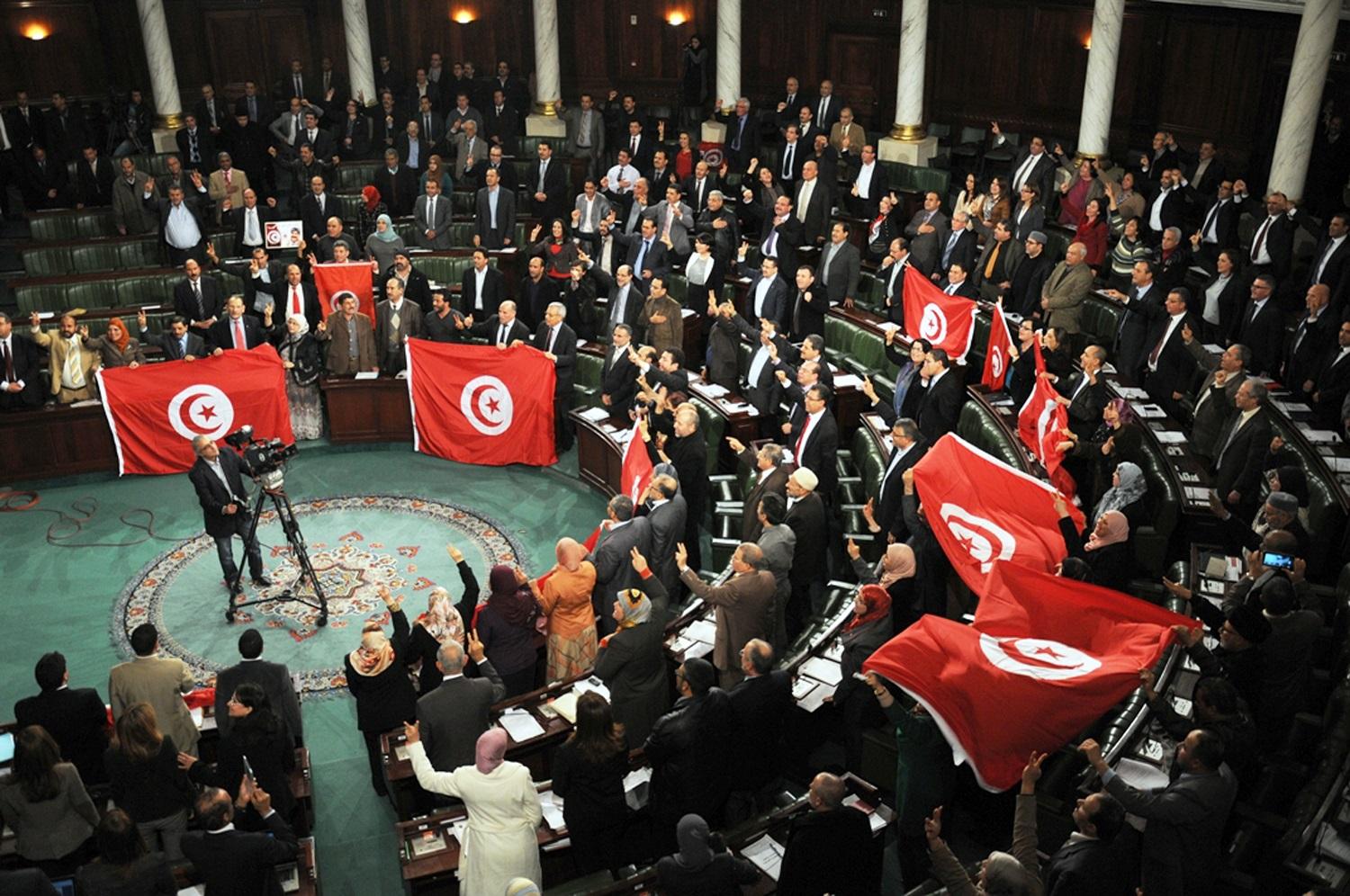Evidence session 2: Building legitimate government
The Commission’s second evidence session, which took place at Oxford’s Blavatnik School of Government on 8 June 2017, focused on the topic of building legitimate government.
In fragile and conflict situations, government has little legitimacy with citizens. This both constrains what government can effectively do, and the ability to change the situation. In designing strategy, it is important that these constraints be recognised: tasks that require more legitimacy than government has will fail. Building legitimacy may be a slow process: there may have been too much reliance upon instant formal processes such as elections, relative to the gradual process of improving citizens’ living conditions.
A blog summarising the key takeaways from the session is available here.
Videos:

Deputies of the Tunisian National Constituent Assembly (NCA) with flags jubilate after the adoption of a new constitution on January 26, 2014, in Tunis. Photo by STR/AFP/Getty Images
Evidence session witnesses
Keith Biddle O.B.E. joined the police service in Manchester in 1962. In the 1980s, he served as a detective chief superintendent in the UK’s second largest police force and assistant chief constable of Kent. He later served, in the rank of deputy assistant commissioner, as assistant to Her Majesty’s Chief Inspector of Constabulary for England and Wales, focusing on counter-terrorism issues and assistance to overseas police institutions. In 1994, he led an EU mission to South Africa to oversee the policing of the first truly democratic elections. After retiring from the police service in late 1994, he became a consultant adviser on policing issues to the UK’s Department for International Development (DFID). From 1998-2003, he served as inspector general of police for Sierra Leone. In 2007-2008, he was UNDP Somalia’s senior law enforcement adviser on reactivating policing in Somalia, Puntland, and Somaliland. In 2001, Her Majesty the Queen admitted him as an officer in the Most Excellent Order of the British Empire (O.B.E.) for his services to Sierra Leone.
Pravin Gordhan is an MP of South Africa. Involved in the anti-apartheid struggle from the 1970s and 1980s, he spent four years underground in the 1980s during which he became involved in the South African Communist Party and African National Congress (ANC). He played a pivotal role in South Africa’s transition as an ANC participant in the multi-party talks at the Convention for a Democratic South Africa and co-chair of the Transitional Executive Council. He chaired the Constitutional Committee overseeing the implementation of the new Constitution adopted in 1996. He continued to actively serve as an ANC MP until March 1998 when he joined South African Revenue Service (SARS) as Deputy Commissioner. He was appointed Commissioner in 1999. In 2009, he was appointed Minister of Finance. He was appointed the Minister of Cooperative Governance and Traditional Affairs in 2014, but was recalled to serve as the Minister of Finance in 2015, remaining in this post until March 2017. He currently also serves as member of the ANC’s National Executive Committee.
Hedi Larbi is an associate at Belfer Center’s Middle East Initiative at the Harvard Kennedy School and former Kuwait Foundation Visiting Scholar (2015-2016). He most recently served as Advisor to the Middle East and North Africa (MENA) Vice President at the World Bank. From 2014-2015, he served as both the Minister of Economic Infrastructure and Sustainable Development and the Economic Advisor to the Prime Minister in Tunisia. He has over 35 years of experience in economic and social development as both a policy advisor and policymaker, with more than two decades of high level work in the World Bank Group, the private sector (in Europe and MENA), and the Tunisian transition government. He has developed, negotiated, and supervised major economic and institutional development programs, and public and private investment operations in various social and economic sectors including major infrastructure projects and economic reforms.
Christina Murray is a member of the Mediation Support Standby Team in the Mediation Support Unit of the UN Department of Political Affairs and Professor of Human Rights and Constitutional Law at the University of Cape Town. Until March 2017 she was Director of the Bingham Centre for the Rule of Law in London. In 2013 and 2014, she provided support to the Yemen National Dialogue and Constitution Drafting Commission. Between 1994 and 1996 she served on a panel of seven experts advising the South African Constitutional Assembly, in 2009 and 2010 she was a member of the Committee of Experts that prepared the 2010 Constitution of Kenya and, in 2012 a member of the Fiji Constitution Commission. Her other work has focused on constitution making processes, constitutional design, and the implementation of constitutional settlements in South Africa and elsewhere, including Nepal, South Sudan, Zimbabwe, and Libya.

